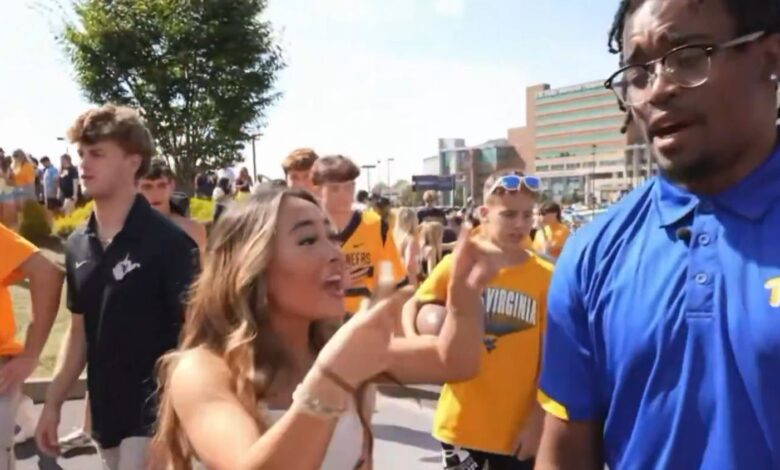Female West Virginia Fan Who Went Viral For Offensive Comment Identified
Female West Virginia Fan Who Went Viral For Offensive Comment Identified

The incident occurred before the West Virginia versus Pittsburgh football matchup, where tensions between rival fan bases escalated into inappropriate territory. The game itself concluded with West Virginia defeating Pittsburgh 31-24, leaving both teams with identical 2-1 records for the season.
A viral video captured an exchange between supporters from opposing teams that quickly moved beyond typical sports banter. The footage shows a Pittsburgh supporter engaging with West Virginia fans in what appeared to be standard rivalry mockery. However, the situation deteriorated when one West Virginia supporter responded with racially charged language.
This guy went to heckle West Virginia fans and was shocked when a girl told him to change his skin color pic.twitter.com/nb4ijmNEG1
— FearBuck (@FearedBuck) September 19, 2025
Key Details of the Incident:
| Element | Description |
|---|---|
| Location | Pre-game festivities before WVU vs Pitt |
| Participants | Multiple fans from both universities |
| Escalation | Standard trash talk turned racist |
| Documentation | Video evidence circulated on social media |
The exchange began with relatively harmless teasing about appearance. The Pittsburgh fan made comments about makeup, which falls within typical rivalry ribbing between opposing supporters. The response from the West Virginia fan crossed established boundaries by targeting race rather than team loyalty or game-related topics.
Social media reactions highlighted the problematic nature of the incident. Many users distinguished between acceptable sports rivalry behavior and unacceptable personal attacks based on immutable characteristics. The contrast between legitimate trash talking and discriminatory comments became a focal point of online discussions.
Public Response Categories:
- Condemnation of racist language regardless of team affiliation
- Commentary on appropriate boundaries in sports rivalries
- Discussion about double standards in media coverage
- Debate over instigation versus response responsibility
The incident reflects broader challenges in college sports culture, where passionate team loyalty sometimes manifests in inappropriate ways. Sports rivalries traditionally involve playful antagonism about team performance, coaching decisions, or school traditions. However, personal attacks targeting race, ethnicity, or other protected characteristics violate both social norms and institutional codes of conduct.
University athletic programs frequently emphasize sportsmanship and respectful competition in their fan conduct policies. These incidents test those standards and often result in disciplinary actions when individuals can be identified. The viral nature of social media amplifies such confrontations beyond their original context.
The Pittsburgh supporter’s measured response drew praise from observers who noted that the situation could have escalated further. His reaction demonstrated restraint despite facing discriminatory language, though some commenters questioned whether his initial approach contributed to the confrontation.
This type of incident occurs periodically across college sports, particularly in heated rivalries with long histories. The West Virginia-Pittsburgh rivalry carries decades of competitive tension, making pre-game interactions between fan bases especially charged. However, historical rivalry intensity does not excuse behavior that crosses ethical boundaries or violates basic respect for human dignity.

A graduate from the University of Texas, Anthony Amador has been credentialed to cover the Houston Texans, Dallas Cowboys, San Antonio Spurs, Dallas Mavericks and high school games all over the Lone Star State. Currently, his primary beats are the NBA, MLB, NFL and UFC.

